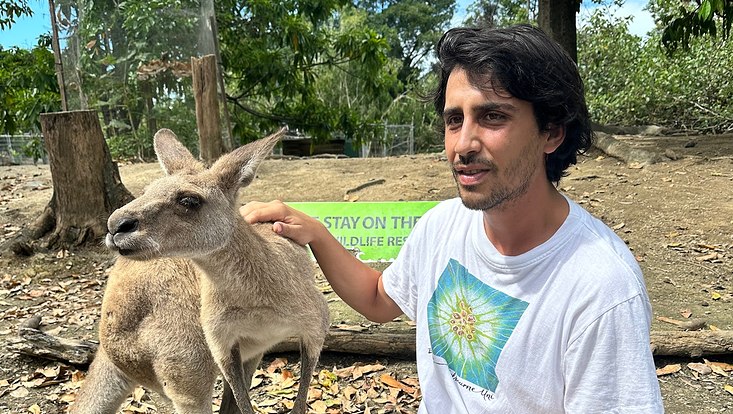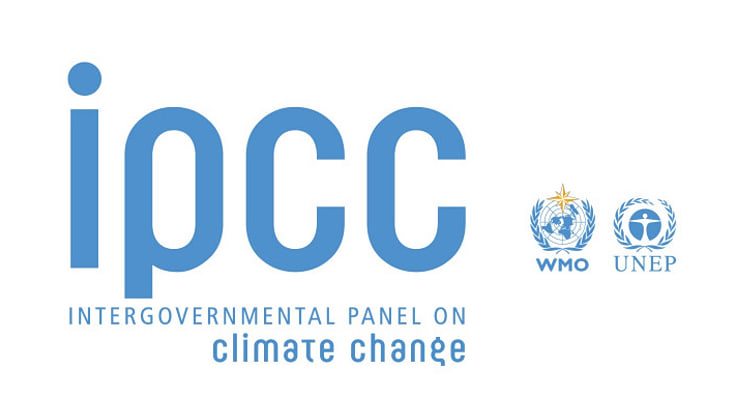Vito Avakumović spends half the time of joint doctoral program in Australia
7 April 2024

Photo: Benjamin Blanz
The PhD student Vito Avakumović spends a year in Melbourne, Australia, within a structured joint doctoral program between the Universität Hamburg and the University of Melbourne. The joint program is funded by the international affairs office (Universität Hamburg), the MIN faculty, CLICCS and the FNK. At the University of Melbourne he researches together with Tom Kompas focusing on aggregating well-known climate change damages into a global, partial damage function.
It's now half time of the joint program. In the following interview, Vito Avakumović speaks about the joint doctoral program, his research focus as well as advantages and challenges of his stay in Australia.

What is the background of your stay?
To contextualise, I am privileged to participate in a structured joint doctoral program between the Universität Hamburg and the University of Melbourne. The joint doctoral program offers a great opportunity to conduct research in two universities and different work groups, resulting in a doctoral degree from both institutions. Besides the career aspect, it offers great opportunity to expand the horizons and meet new people, and consequently, new cultures. The additional information on a joint doctoral program can be found on the university’s webpage.
As a part of a joint program, the requirement is to do at least one year in the host institution, which is in my case University of Melbourne. My one year stay in Australia commenced at the beginning of October 2023, ending with my return to Hamburg in the October this year. Upon arrival, I was welcomed by Prof. Tom Kompas at the Parkville Campus. Administratively, I am enrolled at the School of Agriculture, Food and Ecosystem Sciences, but staying in a Tom’s department (or Lab, how they call it here) that is the Centre of Excellence for Biosecurity and Risk Analysis (CEBRA) . Additionally, I am taking part in a Melbourne Climate Futures Academy, an interdisciplinary cohort of doctoral students from University of Melbourne that are dealing with topics related to climate change.
What topic are you currently working at?
My research focus here is on aggregating well-known climate change damages into a global, partial damage function that will be incorporated into the MIND model within the context of a modified Cost-Risk Analysis. Tom Kompas is an expert in climate-economic modeling, utilizing a highly resolved intertemporal CGE model, which makes it unique in terms of computability and size. In this way, I am combining knowledge from two opposite ends of the spectrum in climate-economic modeling: from a fully aggregated global social planner model to a regionally and sectorally heterogeneous market equilibrium model. Additionally, I am investigating a specific damage function that addresses the impacts of climate change on human health, particularly through changes in mortality and morbidity rates due to the increased incidence of heat-related diseases.
What are the advantages of your stay in Australia, what are the challenges?
Besides the research itself, a stay in Australia offers a set of unique and a life-changing experience. A sheer distance itself makes it already stand out from my stay in Germany, where I would still be at the same time zone with Croatia, which I call home. In comparison to Germany, one thing struck me immediately, and that is how much easier it is to live in a foreign country if you actually speak the language fluently. It has definitely motivated me to sharpen up my German skills! When it comes to livelihood, Melbourne is really an amazing city that offers something to everyone. However, it often feels estranged because of its sheer size, the individualistic lifestyle and a lacking sense of community. Luckily, the colleagues CEBRA nurture a communal and mutually supportive environment so I was lucky in that regard. In general, I think this is where Germany can learn from Australia, and that is being more relaxed and “unofficial” in the settings like university. On the other hand, what I found very amusing is that Australia as a state actually has much bigger set of laws and rules that you must oblige to than Germany. In that regards, the latter having reputation of being very strict might need some revision.
Any further reflection about your stay that you want to share?
Finally, none of this would have been possible without the support from my supervisor, Hermann Held, who never hesitated to go the extra mile to assist me at every step. His efforts made this stay financially and administratively comfortable and secure. A big thank you to Hermann.
To wrap up with a life lesson. Undertaking a joint PhD program far from home presents its own set of obstacles, but where would life be without challenges? After all, pursuing a PhD is about pushing your limits: stepping out of your comfort zone, delving into the unknown, and finding solutions. I eagerly anticipate returning to Hamburg with a transformative year of experiences behind me.
Thank you very much and have a nice further stay in Melbourne!


